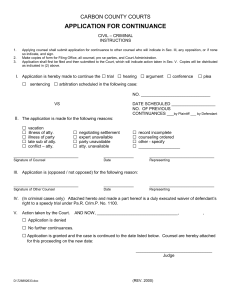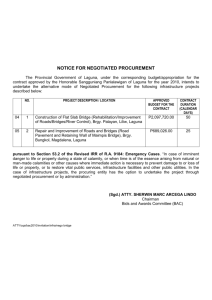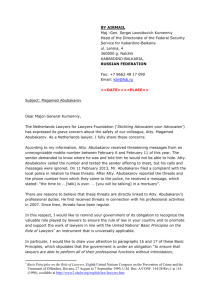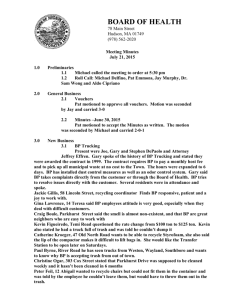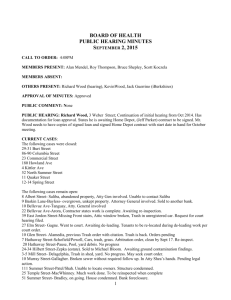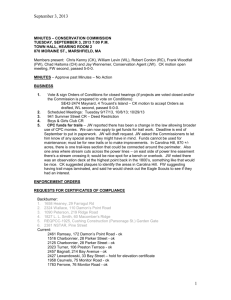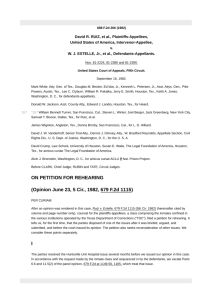Prof Responsibility
advertisement
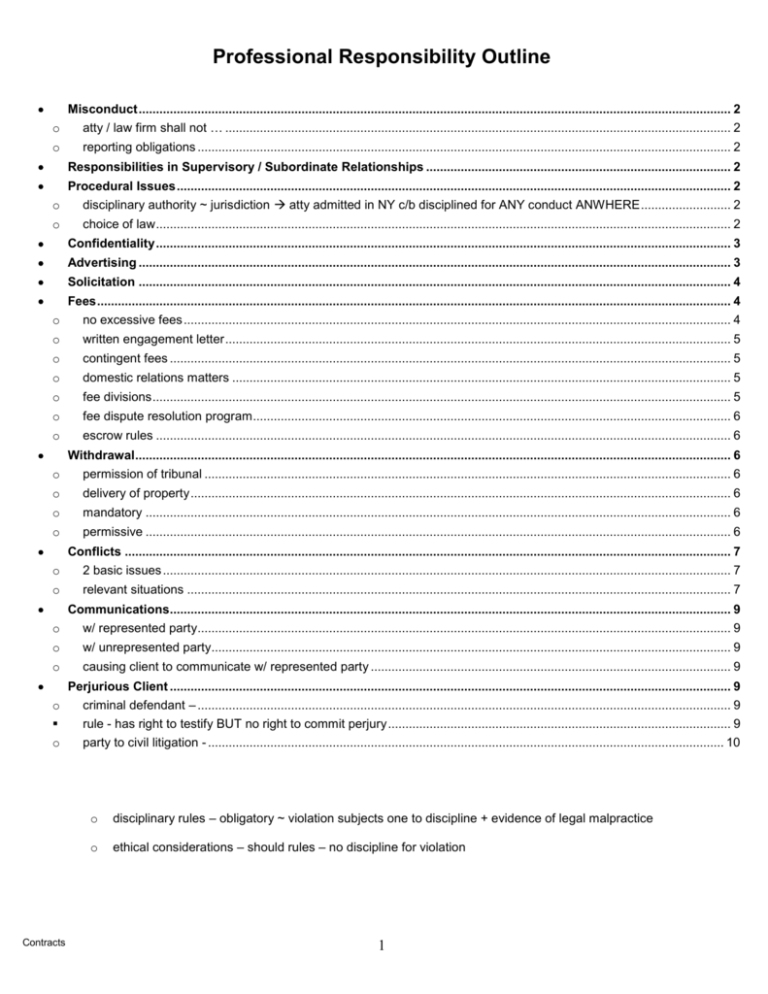
Professional Responsibility Outline Misconduct ........................................................................................................................................................................... 2 o atty / law firm shall not … .................................................................................................................................................. 2 o reporting obligations .......................................................................................................................................................... 2 Responsibilities in Supervisory / Subordinate Relationships ........................................................................................ 2 Procedural Issues ................................................................................................................................................................ 2 o disciplinary authority ~ jurisdiction atty admitted in NY c/b disciplined for ANY conduct ANWHERE .......................... 2 o choice of law ...................................................................................................................................................................... 2 Confidentiality ...................................................................................................................................................................... 3 Advertising ........................................................................................................................................................................... 3 Solicitation ........................................................................................................................................................................... 4 Fees ....................................................................................................................................................................................... 4 o no excessive fees .............................................................................................................................................................. 4 o written engagement letter .................................................................................................................................................. 5 o contingent fees .................................................................................................................................................................. 5 o domestic relations matters ................................................................................................................................................ 5 o fee divisions ....................................................................................................................................................................... 5 o fee dispute resolution program .......................................................................................................................................... 6 o escrow rules ...................................................................................................................................................................... 6 Withdrawal............................................................................................................................................................................ 6 o permission of tribunal ........................................................................................................................................................ 6 o delivery of property ............................................................................................................................................................ 6 o mandatory ......................................................................................................................................................................... 6 o permissive ......................................................................................................................................................................... 6 Conflicts ............................................................................................................................................................................... 7 o 2 basic issues .................................................................................................................................................................... 7 o relevant situations ............................................................................................................................................................. 7 Communications.................................................................................................................................................................. 9 o w/ represented party.......................................................................................................................................................... 9 o w/ unrepresented party...................................................................................................................................................... 9 o causing client to communicate w/ represented party ........................................................................................................ 9 Perjurious Client .................................................................................................................................................................. 9 o criminal defendant – .......................................................................................................................................................... 9 o Contracts rule - has right to testify BUT no right to commit perjury ................................................................................................... 9 party to civil litigation - ..................................................................................................................................................... 10 o disciplinary rules – obligatory ~ violation subjects one to discipline + evidence of legal malpractice o ethical considerations – should rules – no discipline for violation 1 Misconduct o o atty / law firm shall not … … violate DR ~ no contact rule … circumvent DR through actions of another ~ hire PI … engage in illegal conduct adversely reflecting on atty’s honesty / trustworthiness / fitness as atty ~ DUI … conduct w/ dishonesty / fraud / deceit / misrep ~ even if conduct not illegal ~ false info on application … conduct prejudicial to admin of justice ~ Clinton suspension re Jones testimony … unlawful discrimination in practice of law (NY) ~ hiring / promoting … other conduct adversely reflectn on atty fitness as atty ~ misdemeanor / possession of marijuana NY – power to discipline law firms reporting obligations duty to report – atty MUST report other atty violation of DR that raise substantial question re other atty’s honesty / trustworthiness / fitness as atty (don’t report ALL violations ONLY ~ substantial) exception for C&S – if atty learns re violation in context of representation (~ atty seeks advice + client tells / not wants reported) duty of cooperation – if atty called by grievance committee / commission on judicial misconduct att MUST cooperate (reveal ALL except C&S) whistleblowers ~ firing atty for reporting ~ exception to at will employment ALLOWS atty to bring action for wrongful termmination Responsibilities in Supervisory / Subordinate Relationships o law firm – must ensure that all attys comply w/ DR (~ CLE programs) o supervisory atty – same duty as law firm as to subordinates attys (ensure compliance w/ ALL DR) o subordinate atty – must comply w/ DR even if acting at direction of superior Procedural Issues o disciplinary authority o Contracts ~ jurisdictional issue atty admitted in NY c/b disciplined for ANY conduct ANWHERE choice of law conduct in connection w/ proceeding – rules of state where court proceeding conducted (NY will ask if complied w/ rules in foreign jurisdiction) other conduct atty admitted in NY only – NY rules apply multi-license atty –jurisdiction where atty principally practices UNLESS conduct has predominant effect elsewhere apply rules of that jurisdiction 2 Confidentiality confidence – any info protected by A/C privilege (see evidence notes) secret – any other info gained in professional relationship that ANY of client requested confidential + w/b embarrassing OR detrimental to client if revealed effect - wider than confidence – still applies o rule – generally atty shall not ANY reveal C&S + use C&S to disadvantage of Client (consent NOT possible) + use C&S to advantage of atty or T/P (consent ~ possible) o exceptions – atty MAY reveal C&S re ANY of o … w/ informed consent of Client … when required by law / court order … reveal intent of Client to commit crime + info necessary to prevent crime ~ perjury … collect atty fee (sword) / defend self from accusation of wrongful conduct in civil malpractice action / disciplinary proceeding (shield) … implicit in w/d prior written / oral opinion / representation atty now knows t/b false fellow servants – atty must ensure EEs / associates / contributing professionals <> reveal C&S Advertising o rule – atty <> use / disseminate / prep publication / communication to prospective client w/ false / deceptive / misleading claims m/b truthful o items proper in advertising o Education, degrees and other scholastic distinctions Dates of admission to any bar Areas of law in which lawyer or law firm practices – CANNOT say specialize Public offices and teaching positions held in past ~ former DA Memberships in bar associations or other professional societies or organizations Foreign language fluency Names of clients regularly represented – IF client consented in writing Bank references Credit arrangements accepted Legal fees for initial consultation Contingent fee rates – IF ALL of civil matter + describe % as before / after costs / exp + disclose ~ client remains liable for litigation exp if lose Range of fees for services – SLA make written statement available to public for free describing scope of each advertised service Hourly rates Fixed fees for specified legal services Others – professional business card + notice by mail + letterhead + office sign radio and television ads – rule – m/b pre-recorded + taped + approved by atty for broadcast + keep copy ~ 1 yr after last transmission o direct mail – o rule – atty must file copy w/ appellate division (can’t advertise this fact) + keep mailing list ~ 1 yr after last mailing change in rates – Contracts rule – c/n change rate of advertised fees until after reasonable time ~ 30 days 3 o name / address / phone number rule – each ad must include this info for atty / firm whose services offered Solicitation o rule1 – <> solicit professional employment by written / oral communication from prospective client by in person / telephone contact o exceptions – (4) ANY of close friend + relative + former client + current client rule2 – <> solicit professional employment by written / recorded communications IF ANY of … … communication ~ false, misleading or deceptive ~ guarantee results … recipient has communicated a desire not to be solicited by the lawyer … involves coercion, duress or harassment ~ in ambulance / hospital … age or the physical, emotional or mental state of the recipient make it unlikely that recipient will be able to exercise reasonable judgment in retaining an attorney … lawyer expects, but does not disclose, that legal services necessary to handle matter competently w/b performed primarily by lawyer not affiliated with soliciting lawyer as o o referral fees – rule – atty <> give ANYTHING of value to person / entity for recommending employment exception ~ fee split (at 9(E) below) refusing employment – o … partner … associate … of counsel rule – atty MUST refuse employment if person seeking to retain atty does so b/c of violation of DRs web pages passive access by public ~ advertising rules apply active communication by atty ~ solicitation rules apply Fees o no excessive fees rule – atty <> enter agreement / charge / collect excessive fee factors Contracts Time and labor required – no double billing Likelihood, if apparent or made known to the client, that acceptance of particular employment will preclude other employment by the lawyer – allows charging more Locality – can charge rates specific to a location Amount involved and results obtained Time limitations imposed by the client or the circumstances Nature and length of the professional relationship – longer relationship means charge more Experience, reputation and ability of the lawyer Whether fee ~ fixed / contingent (contingent fee CAN result in higher hourly rate BUT certain contingent fees ~ capped by statute (personal injury / medical malpractice)) 4 o written engagement letter rule – now required + if atty paid by insurer to rep insured letter of engagement m/b sent to inurer AND insured effective date – March 4, 2002 contents – explanation of ALL of scope of services t/b provided + fees t/b charged / exp / billing practices + notice of client’s right to arbitration of fee disputes (see F below) exceptions – ANY of … o contingent fees writing – all contingent fees have t/b in writing (ALSO satisfy engagement letter requirements above) contents – engagement letter requirements + ALL of method for determining fee + specify % to atty if settle / trial / appeal + litigation / other exp deducted from recovery + whether exp deducted before / after contingent fee calc’ed written closing stmt – required after representation ends must provide client w/ closing stmt computing fee filing – writing AND closing stmt m/b filed w/ appellate division prohibited in … EITHER criminal matters + domestic relations matters o defn – representing client re claim / action / proceeding during / preliminary to filing of claim / action / proceeding in ANY court re … Contracts effect of violation – merely some evidence of malpractice – CLIENT must show prejudice domestic relations matters o … if used signed retainer agreement that includes 3 above items … fee expected t/b < $3,000 BUT NEVER rely on this exception b/c never know … regular pre-existing client ~ atty services ~ of same general kind as previously rendered & paid for by client … domestic relations matters – must use much more comprehensive retainer agreement (below) … BOTH atty has no office in NY + no material portion of services rendered in NY … divorce + separation + annulment + custody + visitation + maintenance + child support + alimony + proceedings to enforce / modify judgment or order re any of foregoing (~ different from MPRE – b/c irrelevant that already a judgment in the case) fee agreement – m/b ALL of writing as prescribed by court rule + signed by atty AND client required – periodic billing at least every 60 days + atty must return any unused portion of retainer prohibited - contingent fees (~ collect unpaid judgment) + non-refundable fees (~ retainer) disclosure – atty MUST provide prospective client with statement of client’s rights & responsibilities at initial conference AND prior to signing written retainer agreement fee divisions rule - attys <> divide fee for legal services w/ other atty who not a partner / associate of atty’s firm exception – ALL of client consents after full disclosure that fee division w/b made + proper fee division + 5 o proper fee division division is in proportion to services performed by each lawyer OR division may be made in any manner provided each lawyer assumes joint responsibility for the representation in a writing given to client AND total fees of all attys do not exceed reasonable compensation for all legal services rendered to the client. fee dispute resolution program rule - fee disputes b/w atty / client in civil matter are subject to arbitration at client’s option major exceptions – ALL of following <> subject to arbitration … o civil matter ~ includes domestic relations criminal matters amount in dispute <$1,000 OR > $50,000 claims involving legal malpractice notice of right to arbitration – atty must give twice ~ in written letter of engagement + when dispute arises escrow rules see 26 / 27 – of large BARBRI outline Withdrawal o permission of tribunal o o delivery of property rule – atty must return client property ~ unused portion of retainer + file (everything / drafts / internal correspondence) exception – retaining lien ~ allowed until client pays atty bill mandatory o rule – if matter before tribunal atty must ontain court’s permission before w/d when – atty representing client before tribunal must move to w/f from client representation IF ANY of … … atty knows or it is obvious that the client is asserting a position in the litigation merely for the purpose of harassing any person (~ frivolous lawsuit) … continued employment will result in the violation of DR … atty’s mental / physical condition makes unreasonably difficult to carry out employment effectively … client discharge (but atty must still seek judicial permission) permissive when – ANY of … Contracts … c/b accomplished without material adverse effect on the interests of the client 6 … client insists on presenting a frivolous claim or defense … client persists in course of action involving the lawyer’s services that atty reasonable believes ~ criminal or fraudulent … client insists that the lawyer pursue a course of conduct that is illegal / prohibited by DRs … by other conduct, client makes it unreasonably difficult for atty to carry out employment effectively … in matter not before a tribunal client insists that atty engage in conduct that contrary to judgment and advice of atty (tho not prohibited by DRs) … client deliberately disregards agreement / obligation to atty as to expenses / fees (BUT failure to pay bill ~ NOT enough) … client has used the lawyer’s services to perpetrate a crime / fraud (atty realizes after fact) … lawyer’s continued employment is likely to result in a violation of DR … lawyer’s inability to work with co-counsel indicates that the best interests of the client likely will be served by withdrawal … client knowingly and freely agrees to termination of employment … in matter before tribunal lawyer believes in good faith, in a proceeding pending before a tribunal, that the tribunal will find the existence of other good cause for withdrawal modification of rules – NOT allowed Conflicts o o 2 basic issues is there a conflict? can client consent to conflict? relevant situations atty personal interests – <> accept / continue employment if exercise of professional judgment reasonably c/b affected by atty’s own financial / business / property / personal interests consent – effective if BOTH disinterested atty approval + full disclosure of implications of atty’s interest o sex – CANNOT demand sex (domestic relations matter CANNOT have sexual relations w/ client) wills – atty s/n suggest that client give gift / bequest to atty + atty s/n prepare any instrument giving her gift / bequest unless exceptional circumstances (see wills 56-57 outline) Contracts disinterested atty – disinterested atty would believe that representation of client w/n/b adversely affected by the conflict (~ makes this an objective standard) o effect of violation ~ presumption of undue influence o atty as executor – note notice requirements (wills 56-57) mortgages – atty <> take mortgage on client property to secure fee 7 atty / client business transactions - <> enter into business transaction w/ client if BOTH has differing interests therein + client expects atty to protect client’s interest in transaction e.g., - client loans money to atty consent – ALLOWED if ALL … o o o o consent – effective IF BOTH disinterested atty approval + EACH party consents after full disclosure of implications / risks / advantages involved former clients - lawyer who has represented a former client in a matter shall not thereafter represent another person in same / substantially related matter in which the current client’s interests are materially adverse to the interests of the former client why – atty cannot reveal / use C&S of former client to rep current client disqualification motion based on former client conflict – must establish ALL of … Contracts atty advancing money to client – NOT allowed re client in litigation EXCEPT court costs and litigation exp simultaneous representation – <> represent prospective client if exercise of independent judgment on behalf of prospective party likely t/b affected by atty’s representation of current client … transaction is BOTH fair and reasonable to client when both sign and enforce K … transaction is fully disclosed and transmitted in writing to client in terms that can be reasonably understood; … lawyer advises client to seek advice of independent counsel … client consents in writing. o … was A/C relationship b/w moving party and opposing counsel o … matters involved in both representations ~ substantially related o … interests of present & former client ~ materially adverse key scenarios o departing atty – departing atty <> represent client whose interests ~ materially adverse to client of former firm if she acquired C&S while at prior firm ~ material to current matter o firm of departing atty (~ departing atty takes clients w/) - firm ~ prohibited from representing client w/ interests materially adverse to those of client represented by departing atty and NOT currently represented by firm only if attyremaining in firm has information protected as C&S of former client that is material to current matter consent - atty can represent current client in matter substantially related to prior representation of former client, even if current client’s interests ~ adverse to former client, provided former client provides consent after full disclosure wills – no consent possible after testator dies imputed disqualification – atty’s conflict ~ imputed to everyone at firm no atty in while lawyers are associated in a law firm, none of them can accept or continue employment if any one of them, practicing alone, would be prohibited from doing so because of a conflict based on … 8 o … atty personal interests o … simultaneous representation o … former client checking for conflicts – law firms required to have conflicts checking system organizational clients rule – atty must BOTH state that ~atty for organization / NOT for consitutents + advise constituents if interest of org differs from theirs applies when – BOTH atty retained by org deals w/ corp constituents + org’s interests may differ from those of constituents known unlawful acts of constitutents not in corp best interest – atty proceeds as reasonably necessary in best int of corp + minimize disruption to corp / revealing corp C&S + may include ANY of … … asking constituent to reconsider … ask for separate legal opinion … refer matter to higher authority … w/d insured clients rule – atty represents the insured NOT the insurance co paying the bill effect – atty <> reveal C&S to insurance co + <> accept direction from insurer + must send letter of engagement to insurer AND insured Communications o o w/ represented party rule – atty <> communicate w/ party known t/b represented by atty in that matter exceptions – ANY of consent of other atty + communications not relating to representation + communications authorized by law (~ deposition, etc.) w/ unrepresented party o rule – atty <> give advice to unrepresented party EXCEPT advice to secure counsel causing client to communicate w/ represented party rule – atty may cause a client to communicate with represented person, if that person is legally competent, and counsel the client with respect to those communications, provided: atty gives reasonable advance notice to rep’d persons counsel Perjurious Client o Contracts criminal defendant rule - has right to testify BUT no right to commit perjury atty must - 9 o party to civil litigation Contracts Counsel must attempt to persuade the client not to pursue the unlawful course of conduct (tell must recant if already given) If the client insists on presenting perjured testimony, withdrawal from representation may be an appropriate response (atty CAN make motion / not required to) When confronted with the problem during trial, an attorney’s revelation of his client’s perjury to the court is a professionally responsible and acceptable response (MUST be in camera / w/o opposing party) An attorney cannot knowingly use perjured testimony or false evidence rule – party has no Constitutional right to testify anticipated perjury – atty <> put party on stand reference C&S atty may w/d written / oral opinion previously given by atty and now known t/b false 10
